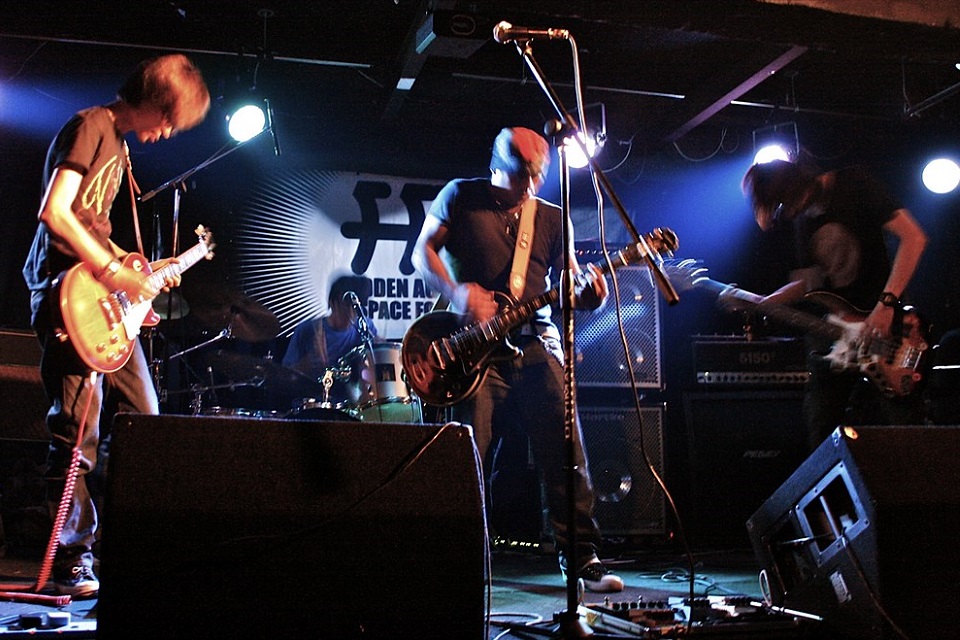Discover HKBU
Surveying the Hong Kong live music scene
29 Jun 2022
Famed for its high rents and small spaces, Hong Kong is not the easiest place to run a music venue or be a musician.
But despite the challenges, according to Dr François Mouillot, a cultural theorist and an Assistant Professor of the Department of Humanities and Creative Writing, once you scratch beneath the surface there are lots of places to play, from small bars to large venues.
“The usual narrative about music in Hong Kong is that it is such a bad place for it, but what’s actually very striking is that there's no lack of infrastructure to support live music,” says Dr Mouillot. “However, one of the unique features of the Hong Kong live music scene is the overwhelming presence of Cantopop, and it does make Hong Kong different from other cities, as it overshadows all other forms of music, including classical and rock. However, rap and hip-hop are becoming a more popular niche among youths.”
Below the Lion Rock
Dr Mouillot is currently exploring the various elements of the live music scene in the city as part of his GRF-funded project entitled “Understanding the Hong Kong Live Music Sector: The Value of Live Music Infrastructures”.
Inspired by similar projects in other parts of the world, such as the UK, Canada, the US, and the Netherlands – and conceived pre-pandemic at an easier time for the music industry – he says that the study aims to be as broad as possible in terms of style and it will act as a health check of the city’s live music scene.
“The goal of the project is to provide a snapshot of the live music sector in Hong Kong across music genres, focusing on the experiences, affordances and struggles of the main players, such as venues, promoters, and artists. In particular, I want to get a picture of the health of the live music sector, and possibly what could be done to help it if it needs help,” he says. “I also want to contribute an Asian cities perspective, because to my knowledge, none of these snapshots of the live music sectors have taken place in Asia, and I think that Hong Kong is a really interesting case study.”
Musical journey
A keen guitarist, Dr Mouillot has always had an interest in music and society, and his interdisciplinary research examines the intersection of Cultural Studies, Media Studies and Music.
“Broadly speaking, I’m interested in how the cultural dimensions of music fit into people’s lives within social, cultural and economic systems. As a university student, I did an undergraduate in Music and Philosophy and I went on to do a master’s in Ethnomusicology, but I quickly realised that I was most interested in studying music as a kind of cultural practice and putting that in relation to broader cultural and social theories, and so I did my PhD in Communication Studies,” he says.
Dr Mouillot first started coming to Hong Kong as an invited researcher during his PhD, and following his graduation from McGill University in Canada, he joined HKBU in January 2019 as a Research Assistant Professor jointly appointed in the Department of Music and the Department of Humanities and Creative Writing, before shifting over to the latter in an Assistant Professor capacity last summer. “I do not work exclusively in the field of music studies, per se, but music has always been one of the main objects of my research,” he adds.
Exploring the Hong Kong music sector
Although he’s still collecting data for the project, his research has so far revealed the value of live music to people in the city in both a cultural and economic sense. From speaking to people at live events such as the 2021 West Kowloon Jazz Festival to initial interviews with promoters, venue owners and artists, the conversations have revealed the vital role that music plays in people’s social lives, as well as how it contributes to their well-being.
“The study is happening at a very unusual time. The pandemic has put a lot of people under pressure, and live music has become a rare commodity during this time. People I’ve spoken to are realising how precious live music is in their lives and it’s a very significant cultural activity for people right now,” he says. “For the promoters and artists, this is also their livelihood. So, whenever they can hold a performance, it’s an event, but for a lot of them, it’s literally a lifesaving one.”
In addition, Dr Mouillot’s work has been delving into the reasons behind the uneven levels of support for infrastructure, which has created issues for certain sectors of the live scene, as well as how Cantopop continues to dominate the musical landscape.
Cantopop’s long shadow
For a city renowned for its Cantopop, from legendary artists such as Leslie Cheung, Anita Mui and Beyond to more recently the ubiquitous Mirror, it can be hard to escape the long shadow cast by Cantopop over the Hong Kong music scene.
“Cantopop is dominant – it has the largest audience and it’s the most visible. It is a very rich and important part of Hong Kong’s musical culture, but as a result, it perhaps doesn’t leave a lot of room for other styles to develop and flourish. Therefore, other genres that aren’t traditionally seen as independent or indie, such as jazz, tend to operate in a more ‘do-it-yourself’ or independent kind of way, as there is often less institutional support for them,” he says.
When it comes to venues, different actors have also benefitted from the subsidies throughout the pandemic, but it’s uneven in nature. Bigger businesses have tended to do better, and for example, all Leisure and Cultural Services Department venues were protected, while independent venues have struggled more. In addition, zoning issues, i.e. how a certain building is zoned for one particular use, and red tape can also hinder the development of some smaller venues and prevent them from easily adapting. As a result, it’s difficult for more niche musical areas to flourish.
Dr Mouillot says that some venues that cater for particular genres of music may try and subsidise their existence by becoming a bar or restaurant, and venues and artists also tried livestreaming events during the various waves of the pandemic, but the spectre of zoning restrictions looms large. Other issues can also arise, as traditional rock bands may need more space to practice with room for a drum kit and multiple amplifiers, but in a city notorious for its high rents, it can be hard to find affordable practice room space.
“There is an uneven landscape in terms of access to resources and there are gross imbalances in terms of revenues at each end,” says Dr Mouillot of the economic side of things. “During the first wave of restrictions, livestreaming was seen as a good way to experiment, but in the second wave of restrictions there was less interest, as perhaps the novelty had worn off a bit, and it didn’t prove to be a good way to make money.”
Towards a new day
As for the future of live music in Hong Kong, it may take a while for various parts of the music scene to get back on their feet. Dr Mouillot also thinks that we may also see structural changes in the scene, and with lengthy quarantine protocols still in place for the foreseeable future, fewer international musicians coming to Hong Kong. This may impact the sector in different ways, but it isn’t always negative.
“Hong Kong is ultimately a small market, and it was never the destination for many touring acts in the Asia-Pacific. It’s going to be a long road to recovery for the sector, but we may see more local artists emerge as the city is not so exposed to international artists. The rise of Mirror may be a by-product of this, as big K-pop bands couldn’t come to Hong Kong on tour,” he adds.
But whatever happens to the music scene, it has demonstrated its resilience before, and Dr Mouillot’s study will shed light on its current state and the steps that can be taken to support its continuing evolution.

